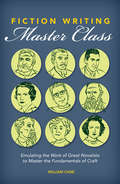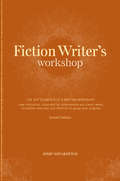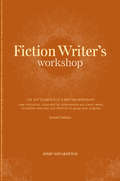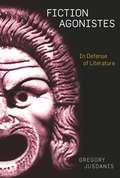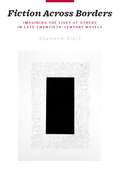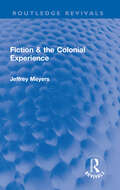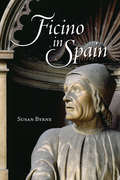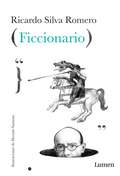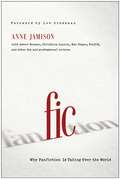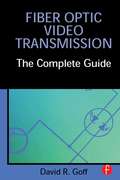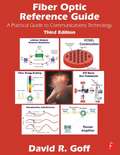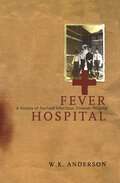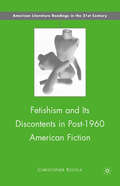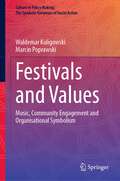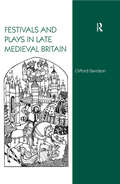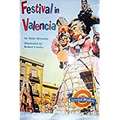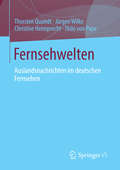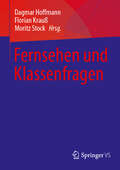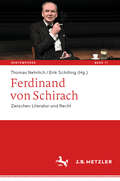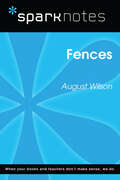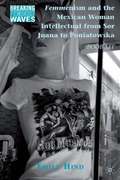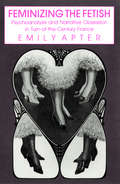- Table View
- List View
Fiction Writing Master Class: Emulating the Work of Great Novelists to Master the Fundamentals of Craft
by William CaneWant to find your voice? Learn from the best! In your development as a writer, you've likely been told to develop your own unique writing style, as if it were as simple as pulling it out of thin air. But finding your voice isn't easy--it requires time, practice, and a thorough understanding of how great fiction is written. Fiction Writing Master Class analyzes the writing styles of twenty-one superior novelists including Charles Dickens, Edith Wharton, Franz Kafka, Flannery O'Connor, Ray Bradbury, and many others. This fascinating and insightful guide mines the writing secrets of these exceptional authors and shows you how to use them to develop a writing style that stands out in a crowd. You'll discover how to: Create characters as memorable as Herman Melville's Captain Ahab Master point of view with techniques from Fyodor Dostoevsky Pick up the pace by keeping your sentences lean like Ernest Hemingway Incorporate sensual details like James Bond creator Ian Fleming Add suspense to your story by following the lead of horror master Stephen King And that's not all, Fiction Writing Master Class is your key to understanding and implementing the proven techniques of history's greatest authors, taking your writing to a whole new level of excellence in the process.
Fiction Writer's Workshop: The Key Elements of a Writing Workshop
by Josip NovakovichMaster the Elements of the Writing Workshop The great paradox of the writing life is that to be a good writer, you must be both interested in the world around you and comfortable working in solitude for hours on end. Fiction Writer's Workshop, Second Edition, is designed to help you foster a strong sense of independence#151;of being and thinking on your own, of becoming self-evaluative without being self-critical#151;in order to accomplish what others seek in classroom groups. In this comprehensive guide, award-winning writer and teacher Josip Novakovich explores every aspect of the art of fiction and provides all the tools and techniques you'll need to develop day-to-day discipline as well as a personal writing style, such as: More than 100 writing exercises, including dozens that are new to this edition, that challenge you to experiment with diverse writing styles Specific statements of purpose for each exercise, to help guide you and instruct you at every step of the creative process Self-critique questions to help you assess your work and identify strengths and weaknesses before moving on to the next lesson The full text of eight acclaimed short stories, with analysis and exercises, to provide models for your own writing and help reinforce the lessons you've learned The practical, insightful methods offered in this workshop will clarify your voice, broaden your perspective, and strengthen your fiction.
Fiction Writer's Wokrshop
by Josip NovakovichMaster the Elements of the Writing Workshop The great paradox of the writing life is that to be a good writer, you must be both interested in the world around you and comfortable working in solitude for hours on end. Fiction Writer's Workshop is designed to help you foster a strong sense of independence#150;of being and thinking on your own, of becoming self-evaluative without being self-critical#150;in order to accomplish what others seek in classroom groups. In this comprehensive guide, award-winning writer and teacher Josip Novakovich explores every aspect of the art of fiction and provides all the tools and techniques you'll need to develop day-to-day discipline as well as a personal writing style, such as: More than 100 writing exercises, including dozens that are new to this edition, that challenge you to experiment with diverse writing styles Specific statements of purpose for each exercise, to help guide you and instruct you at every step of the creative process Self-critique questions to help you assess your work and identify strengths and weaknesses before moving on to the next lesson The full text of eight acclaimed short stories, with analysis and exercises, to provide models for your own writing and help reinforce the lessons you've learned The practical, insightful methods offered in this workshop will clarify your voice, broaden your perspective, and strengthen your fiction.
Fiction Agonistes: In Defense of Literature
by Gregory JusdanisJusdanis, who is not further identified, defends literature as a form of art, and art as a purveyor of beauty, and beauty as one of the necessary conditions for being human, one that has been neglected at best but too often heaped with facile praise or denigration in the jaded spheres of academe. He considers overture and themes, art's apology, two autonomies, art as parabasis, the line between living and pretending, and the future of a fiction. Annotation ©2010 Book News, Inc. , Portland, OR (booknews. com)
Fiction Across Borders: Imagining the Lives of Others in Late-Twentieth-Century Novels
by Shameem BlackTheorists of Orientalism and postcolonialism argue that novelists betray political and cultural anxieties when characterizing "the Other." Shameem Black takes a different stance. Turning a fresh eye toward several key contemporary novelists, she reveals how "border-crossing" fiction represents socially diverse groups without resorting to stereotype, idealization, or other forms of imaginative constraint. Focusing on the work of J. M. Coetzee, Amitav Ghosh, Jeffrey Eugenides, Ruth Ozeki, Charles Johnson, Gish Jen, and Rupa Bajwa, Black introduces an interpretative lens that captures the ways in which these authors envision an ethics of representing social difference. They not only offer sympathetic portrayals of the lives of others but also detail the processes of imagining social difference. Whether depicting the multilingual worlds of South and Southeast Asia, the exportation of American culture abroad, or the racial tension of postapartheid South Africa, these transcultural representations explore social and political hierarchies in constructive ways. Boldly confronting the orthodoxies of recent literary criticism, Fiction Across Borders builds upon such seminal works as Edward Said's Orientalism and offers a provocative new study of the late twentieth-century novel.
Fiction Across Borders: Imagining the Lives of Others in Late-Twentieth-Century Novels
by Shameem BlackTheorists of Orientalism and postcolonialism argue that novelists betray political and cultural anxieties when characterizing "the Other." Shameem Black takes a different stance. Turning a fresh eye toward several key contemporary novelists, she reveals how "border-crossing" fiction represents socially diverse groups without resorting to stereotype, idealization, or other forms of imaginative constraint. Focusing on the work of J. M. Coetzee, Amitav Ghosh, Jeffrey Eugenides, Ruth Ozeki, Charles Johnson, Gish Jen, and Rupa Bajwa, Black introduces an interpretative lens that captures the ways in which these authors envision an ethics of representing social difference. They not only offer sympathetic portrayals of the lives of others but also detail the processes of imagining social difference. Whether depicting the multilingual worlds of South and Southeast Asia, the exportation of American culture abroad, or the racial tension of postapartheid South Africa, these transcultural representations explore social and political hierarchies in constructive ways. Boldly confronting the orthodoxies of recent literary criticism, Fiction Across Borders builds upon such seminal works as Edward Said's Orientalism and offers a provocative new study of the late twentieth-century novel.
Fiction & the Colonial Experience (Routledge Revivals)
by Jeffrey MeyersBritish colonialism provided a rich vein of material for the novelists of the first half of the 20th century. This study, originally published in 1968, looks at five writers and their reaction to the Empire: Rudyard Kipling, E. M. Forster, Joseph Conrad, Joyce Cary and Graham Greene. It shows how the romantic adventure stories of Kipling’s early days, in which the indigenous population plays almost no part, gave rise to the much more important novels of spiritual and moral conflict in which the stereotyped values of Empire are questioned. The decline of colonialism from its apogee in the 1880s within a relatively short period makes the novels discussed a compact group, so that not only is the use of colonial material closely studied, but its impact on the novelists themselves emerges clearly. This is an important study of a major literary theme, linking modern literature and modern history at a vital point.
Ficino in Spain
by Susan ByrneAs the first translator of Plato's complete works into Latin, the Florentine writer Marsilio Ficino (1433-99) and his blend of Neoplatonic and Hermetic philosophy were fundamental to the intellectual atmosphere of the Renaissance. In Spain, his works were regularly read, quoted, and referenced, at least until the nineteenth century, when literary critics and philosophers wrote him out of the history of early modern Spain.In Ficino in Spain, Susan Byrne uses textual and bibliographic evidence to show the pervasive impact of Ficino's writings and translations on the Spanish Renaissance. Cataloguing everything from specific mentions of his name in major texts to glossed volumes of his works in Spanish libraries, Byrne shows that Spanish writers such as Miguel de Cervantes, Lope de Vega, Bartolomé de las Casas, and Garcilaso de la Vega all responded to Ficino and adapted his imagery for their own works. An important contribution to the study of Spanish literature and culture from the fifteenth to the seventeenth centuries, Ficino in Spain recovers the role that Hermetic and Neoplatonic thought played in the world of Spanish literature.
Ficcionario
by Ricardo Silva RomeroTreinta y cinco definiciones sobre la ficción y el drama de uno de los autores colombianos más importantes de la actualidad. "Puede ser que las cosas pasen porque sí, pero yo me he jugado la vida por el drama. He creído, porque en algo hay que creer, que todo sucede por algo y para algo. Y que cada historia del mundo puede ser contada en tres actos". Ricardo Silva Romero Lo primero que el lector debe saber sobre este Ficcionario es que no es, precisamente, un libro de ensayos sobre literatura. Sí es, en cambio, una colección de respuestas a treinta y cinco sospechas que Ricardo Silva Romero ha venido despejando a lo largo de su vida como escritor, sobre las formas en las que el drama -o la ilusión de que todo tiene sentido- está presente en la vida y en las distintas manifestaciones del arte. A modo de bestiario de la ficción, y con ilustraciones de Hernán Sansone para abrir cada capítulo, aquí el autor realiza un inventario de sus pasiones -el cine de Alfred Hitchcock, de Martin Scorsese, de Woody Allen, de Mike Nichols; la literatura de Alejandro Dumas, de Paul Auster, de los hermanos Grimm; la poesía de César Vallejo; la música de Paul Simon, entre muchas otras-, que ejemplifican de manera brillante una amplia gama de temas relacionados con las decisiones que hay detrás de cada historia y de cada personaje. Escrito con un profundo respeto por el oficio, Ficcionario es un libro esencial para lectores, espectadores, directores, escritores o cualquier persona interesada en descifrar el arte de contar historias.
Fic: Why Fanfiction Is Taking Over the World
by Anne JamisonWhat is fanfiction, and what is it not? Why does fanfiction matter? And what makes it so important to the future of literature? Fic is a groundbreaking exploration of the history and culture of fan writing and what it means for the way we think about reading, writing, and authorship. It's a story about literature, community, and technology—about what stories are being told, who's telling them, how, and why. With provocative discussions from both professional and fan writers, on subjects from Star Trek to The X-Files and Buffy the Vampire Slayer to Harry Potter, Twilight, and beyond, Fic sheds light on the widely misunderstood world(s) of fanfiction—not only how fanfiction is transforming the literary landscape, but how it already has. Fic features a foreword by Lev Grossman (author of The Magicians) and interviews with Jonathan Lethem, Doug Wright, Eurydice (Vivean Dean), and Katie Forsythe/wordstrings. Cyndy Aleo (algonquinrt; d0tpark3r) V. Arrow (aimmyarrowshigh) Tish Beaty (his_tweet) Brad Bell Amber Benson Peter Berg (Homfrog) Kristina Busse Rachel Caine Francesca Coppa Randi Flanagan (BellaFlan) Jolie Fontenot Wendy C. Fries (Atlin Merrick) Ron Hogan Bethan Jones Christina Lauren (Christina Hobbs/tby789 and Lauren Billings/LolaShoes) Jacqueline Lichtenberg Rukmini Pande and Samira Nadkarni Chris Rankin Tiffany Reisz Andrew Shaffer Andy Sawyer Heidi Tandy (Heidi8) Darren Wershler Jules Wilkinson (missyjack) Jen Zern (NautiBitz)
Fiber Optic Video Transmission: The Complete Guide
by David GoffFiber Optic Video Transmission: The Complete Guide is the only comprehensive reference to the techniques and hardware required to transmit video signals over optical fiber. As the broadcast industry moves to HDTV and enhanced television standards become the norm, fiber will become the medium of choice for video transmission, and this book is the essential guide to transmitting video over fiber optic cables. From the most basic video signal to complex multi-channel high definition video, this book details the methods of encoding video signals (including AM, FM, and digital encoding), the advantages and disadvantages of all encoding methods, and the expected performance of each method. A discussion of the the fiber optic components - such as lasers, LEDs, detectors, connectors, and other components - that are best for video transmission applications is also included. A glossary of terms, appendices of standards and publications, and a complete index round out this comprehensive guide.
Fiber Optic Reference Guide: A Practical Guide To The Technology
by David GoffThe Fiber Optic Reference Guide offers readers a solid understanding of the principles of fiber optic technology, especially as it relates to telecommunications, from its early days to developing future trends. Using a minimum of jargon and a wealth of illustrations, this book provides the underlying principles of fiber optics as well as essential practical applications. The third edition is updated to include expanded sections on light emitters, semiconductor optical amplifiers, Bragg gratings, and more systems design considerations. Fiber optics plays a key role in communications, as well as in broadcast and cable systems. Engineers working with fiber optics as well as newcomers to the industry will find the third edition of this reference guide invaluable. It will help the reader develop a solid understanding of the underlying principles of this rapidly changing technology as well as its essential practical applications. The text is thoroughly indexed and illustrated.
Fever Hospital: A History of Fairfield Infectious Diseases HospitaL
by W K AndersonInfectious diseases have threatened life and social order throughout human history, inducing deep and pervasive fear. The story of Fairfield Hospital is central to the story of infectious diseases in Victoria, and is thus a significant chapter in Australia's history. Fairfield Infectious Diseases Hospital began life in 1904 as a fever hospital. It treated patients for typhoid, diphtheria, cholera and smallpox, and grappled with epidemics of polio and scarlet fever. It later became one of the world's foremost centres for the research and treatment of infectious diseases, especially HIV/AIDS. And then it was closed, in 1996, amid controversy, protest and distress. Fever Hospital is an invaluable record of the work and achievements of Fairfield. W. K. Anderson sets these achievements in the context of Australian developments in medicine and health. He describes important initiatives in research, medical treatment and patient care. He traces a century of change in organisational structure and personnel. The combined expertise of the Fairfield Hospital team is now scattered. But Anderson, in gathering together the fruits of their knowledge, experience and skill, has ensured that the story of a remarkable and much-loved hospital is not lost to us. Fever Hospital is a valuable social and institutional history. But above all it is a faithful, tangible and generously illustrated record of a great hospital, written for the people who worked at Fairfield and for those who found healing and comfort there.
Fetishism and Its Discontents in Post-1960 American Fiction
by Christopher KocelaThis study explores the concept of fetishism as a strategy for expressing social and political discontent in American literature, and for negotiating traumatic experiences particular to the second half of the twentieth century.
Festivals and Values: Music, Community Engagement and Organisational Symbolism (Culture in Policy Making: The Symbolic Universes of Social Action)
by Waldemar Kuligowski Marcin PoprawskiThis is an original book, covering all the past areas of research anyone would need to know about festivals and ‘event-based culture’. It is based on academic research but written in a way relevant for cultural professionals – uniquely explaining the cultural power of festivals, and with original empirical research, the realities of organisation and management, and social and economic value. Dr Jonathan Vickery, Reader in Cultural Policy Studies and Director: Centre for Cultural and Media Policy Studies, Univeristy of Warwick.This book discusses music festivals in the context of the specific values they convey. Today, music festivals are a permanent feature of national, regional and local cultural policies, a valuable asset in the tourism industry and a significant source of income for an industry that has been adversely affected by the steady decline in physical sales of music. For the audience, on the other hand, it is an opportunity to escape from everyday life, multi-sensory contact with art, an activity that stands for “full-body participation”– a cultural phenomenon that drags people out of their homes like no other. There is one common denominator linking the above-mentioned features of contemporary music festivals – namely the world of values. This is evident from the non-accidental locations, festivals spaces’ design, planning and the line-ups created consciously, with great care. The organisers’ “missions”, logos, and other symbolic organisational artefacts communicate specific values. These values are explicitly mentioned by artists and audiences: they can be easily identified in online forums and media reports; participant behaviour, festival “rituals” and additional festival programs are shaped on the basis of values, and cooperation is built between the festival and the local community. As the reader will quickly realize, numbers and statistics sit alongside descriptions and quotations in this book, and the organisers’ statements are accompanied by the opinions of academics, but above all the festival audience is given a voice – both through quotations and their drawings. This voice is by no means uniform, as it turned out that research into values was often transformed into a pretext for spinning tales about one’s life situation, one’s political preferences, and one’s understanding of freedom and responsibility. Memories were mixed with declarations, joy with regret, curses with dreams, prose with poetry. Thomas Pettitt was not wrong in noting that “Social history has learnt to appreciate festival as a valuable window on society and its structures”. The authors have tried to open all the windows available. Students and researchers in the fields of cultural anthropology, social psychology, folklore studies, comparative religion, sociology of culture, cultural policy, cultural history, and cultural management will find this book highly interesting.
Festivals and Plays in Late Medieval Britain
by Clifford DavidsonBased in records and iconography, this book surveys medieval festival playing in Britain more comprehensively than any other work to date. The study presents an inclusive view of the drama in the British Isles, from Kilkenny to Great Yarmouth, from Scotland to Cornwall. It offers detailed readings of individual plays-including the York Creed Play, Pentecost and Corpus Christi plays and the little studied Bodley plays, among others - as well as a summary of what is known of their production. Clifford Davidson here extends the usual chronological range to include work typically categorized as early modern, enabling a juxtaposition of earlier plays with later plays to yield a better understanding of both. Complementing documentary evidence with iconographic detail and citation of music, he pinpoints a number of common misconceptions about medieval drama. By organizing the study around the rituals of the liturgical seasons, he clarifies the relationship between liturgical feast and dramatic celebration.
Fernsehwelten
by Thorsten Quandt Jürgen Wilke Christine Heimprecht Thilo PapeDer Band vermittelt ein eindrückliches Bild vom Stand der Auslandsberichterstattung im deutschen Fernsehen. Auf der Basis inhaltsanalytischer Untersuchungen, einer Repräsentativbefragung unter deutschen Fernsehzuschauern sowie Leitfadeninterviews mit Journalisten aus den produzierenden Redaktionen werden die Erkenntnisse eines umfassenden Projekts zur Erforschung der Auslandsnachrichten im deutschen Fernsehen diskutiert.
Fernsehen und Klassenfragen
by Dagmar Hoffmann Florian Krauß Moritz StockDer Sammelband untersucht das Verhältnis von Klasse – einer nicht nur ökonomischen, sondern auch kulturellen und politischen Kategorie – und dem Fernsehen in seinen gegenwärtigen hybriden Formen vor allem aus vier Perspektiven: Erstens geht es um Klassenfragen im Fernsehen, auf der Ebene der Repräsentation, zweitens um Klassenfragen des Fernsehens auf der Seite der Produktion. Hier ist zum Beispiel zu analysieren, welche Klassen welches Fernsehen (für welche Klassen) entwickelt und herstellt. Unter drittens Klassenfragen beim Fernsehen fallen Beiträge, die sich auf die Seite der Rezeption fokussieren und zum Beispiel die Lesarten zu spezifischen Klassendarstellungen beleuchten. Viertens nimmt der Band Klassenfragen der Fernsehwissenschaft in den Blick und reflektiert in diesem Zusammenhang ihre Lücken und ihre Prägung durch Klassenzugehörigkeit.
Ferdinand von Schirach: Zwischen Literatur und Recht (Kontemporär. Schriften zur deutschsprachigen Gegenwartsliteratur #17)
by Erik Schilling Thomas NehrlichFerdinand von Schirach war lange Strafverteidiger, bevor er mit dem Erzählband Verbrechen einen sensationellen Debüterfolg feierte. Seither hat er ein umfangreiches und vielfältiges literarisches Werk veröffentlicht. Mit über 10 Millionen verkauften Büchern und Übersetzungen in über 40 Ländern gehört Schirach zu den meistgelesenen deutschen Gegenwartsautoren. Wie erklärt sich dieser Erfolg? Was zeichnet seine Texte aus, ästhetisch, diskursiv und politisch? Die im vorliegenden Band versammelten Beiträge untersuchen Schirachs Werk aus literatur-, kultur- und rechtswissenschaftlicher Perspektive: seine Poetik, seine Medien und vor allem seine Verbindung von Literatur und Recht.
Fences (SparkNotes Literature Guide Series)
by SparkNotesFences (SparkNotes Literature Guide) by August Wilson Making the reading experience fun! Created by Harvard students for students everywhere, SparkNotes is a new breed of study guide: smarter, better, faster.Geared to what today's students need to know, SparkNotes provides:*chapter-by-chapter analysis *explanations of key themes, motifs, and symbols *a review quiz and essay topics Lively and accessible, these guides are perfect for late-night studying and writing papers.
Femmenism and the Mexican woman intellectual from Sor Juana to Poniatowska: Boob Lit
by Emily HindHind draws on poetry, short stories, plays, novels, photographs, personal correspondence, advertising, and interviews to make visible the anti-feminine tendencies in femmenism and to imagine a femmenism that will appeal to the next generation of women.
Feminizing the Fetish: Psychoanalysis and Narrative Obsession in Turn-of-the Century France
by Emily ApterShoes, gloves, umbrellas, cigars that are not just objects—the topic of fetishism seems both bizarre and inevitable. In this venturesome and provocative book, Emily Apter offers a fresh account of the complex relationship between representation and sexual obsession in turn-of-the-century French culture. Analyzing works by authors in the naturalist and realist traditions as well as making use of documents from a contemporary medical archive, she considers fetishism as a cultural artifact and as a subgenre of realist fiction. Apter traces the web of connections among fin-de-siècle representations of perversion, the fiction of pathology, and the literary case history. She explores in particular the theme of "female fetishism" in the context of the feminine culture of mourning, collecting, and dressing.
